
What Supplements Should You Give a Dog With Occasional Allergies?
Share
Scratching, itching, sneezing, weepy and watery eyes and noses; these are all symptoms a pup with occasional allergies may experience. Our pets can suffer from temporary allergies much, in the same way, we as humans do.
These temporary allergies can be from external triggers like dust, pollen, fleas, or mites, or they could be suffering from food-related allergies. No matter what is causing your dog’s occasional allergies, you just know she is miserable, and sometimes her misery can translate into frustration for you as a pet owner. It can be hard to determine the best course of action in handling a dog with bad occasional allergies.
We often consider our pet’s health as important as our own. As such, we don’t want to just care for them, we want to care for them properly and in the most holistic and natural way possible.
We take our dog’s healthcare very seriously, and just like our own bodies, we want to be careful that the things we give them, from food to treats to supplements, are not just healthy, but also beneficial and safe. It’s very important to learn the foundations of basic pet care so you know how to triage and take care of your pet and anything that is bothering them.
The best way to care for a dog who appears to be unhappy or experiencing occasional allergy symptoms is to:
- Assess the situation. Ensure your dog is not in need of emergency care. Is your dog experiencing congestion or trouble breathing? Trouble breathing is different from simple congestion. If your dog is experiencing trouble breathing, she needs veterinary attention immediately.
- Make her comfortable. If she is not experiencing trouble breathing, make her comfortable by ensuring she has water, food if needed, and a comfortable place to lay.
- Contact her veterinarian. It’s important to call your dog’s veterinarian and get her a full exam before considering administering any supplements to her for any condition, including her occasional allergies.
Signs of Occasional Allergies
It may not be easy to figure out if your dog has temporary allergies or not. While some dogs may be very symptomatic, other dogs may be brave environmental allergy warriors that show very few, if any, symptoms, unless or until they are very uncomfortable. Additionally, dogs can suffer from environmental and food-related allergies. The symptoms for both will be different. Symptoms of environmental allergies will likely include some or all of the following:- Excessive itching and scratching. Every dog itches and scratches, but dogs that can’t stop scratching and clawing (sometimes to the point of self-harm like fur loss and breaks in the skin) may be suffering from an external allergen.
- Weepy, watery eyes. Many breeds of dogs have issues with watery, weeping eyes, which can be normal for them. However, if your dog rarely has excessive eye drainage and has suddenly developed a discharge from their eyes, it can mean they’re dealing with an environmental allergy.
- Discharge from the nose. Most dogs won’t have runny noses unless their histamine response has been triggered. As such, keep an eye out for dogs who seem to have runny noses as it may mean they are allergic to something in their immediate environment.
Common Allergens for Dogs
Just like humans, dogs can be allergic to certain flowering plants when they bloom, or even certain insects. These external factors trigger your dog’s histamine response and the result is a collage of occasional allergy-related symptoms like the ones listed above. Environmental allergies can be:- Dust
- Dust mites
- Fleas
- Pollen
- Ragweed
- Mold/mildew
- Certain proteins (beef, chicken, lamb)
- Gluten
- Dairy
- Soy


